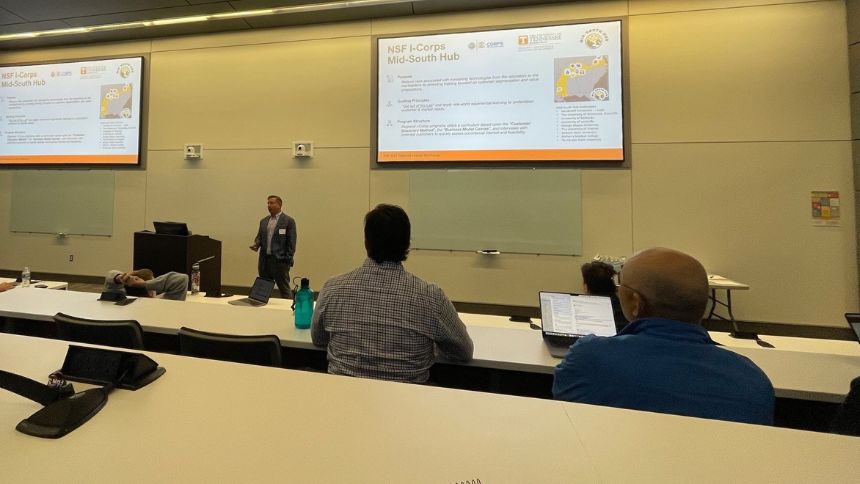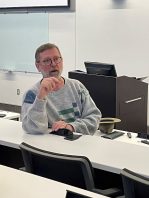
Fall sprint for UTK-hosted I-Corps program underway
Nine participants represent a diverse set of interests and opportunities.
The most novel explanation of one of the nine participants going through the latest Regional I-Corps Program came from Ryan Ginder who compared what he was doing with Team Glass Act to hot dogs.
Like most of the participants except a few, he’s a faculty member at the University of Tennessee (UT), Knoxville, one of the nine institutions of higher education that comprise the Vanderbilt University-led and National Science Foundation-funded Mid-South I-Corps Hub.
At a kick-off event on Thursday at the UT Research Park, Ginder and the other eight teams began a three-week sprint to complete at least 20 customer discovery interviews that will help them better understand the needs of those companies and individuals who might buy their product. There will be office hours for the teams and their advisors and a midpoint check-in ahead of the finale on November 14.

The twice-a-year sessions are organized by the Entrepreneurship and New Ventures team in UTK’s Office of Research, Innovation, and Economic Development. And, as has been the case for years, the first session on customer discovery is always taught by Shawn Carson, a Senior Lecturer in UTK’s Department of Management and Entrepreneurship.
So, you are no doubt wondering about why Ginder compared hot dogs and what he was doing. The answer lies in the word “trimmings.” Hot dogs are made from emulsified meat trimmings – some combination of chicken, beef, or pork – before being blended with other ingredients like preservatives, spices, and coloring.
The case of the Team Glass Act is focused on repurposing fiberglass trimmings to make new technical yarns for advanced composite manufacturing. In other words, he’s turning a waste item into something more valuable.
Other participants included:
- Alec Readel of Applied 2D Materials plans to license a technology from Oak Ridge National Laboratory and produce a novel costing for anti-corrosion to combat degradation in metals.
- Stephen Newby of M-Bot Biosystems Lab has developed a biocompatible, biodegradable, and nano-tunable resin bioink. He owns veterinary clinics in Clinton and Norris and is on the faculty at the UTK College of Veterinary Medicine. Newby hopes to market the technology for use for orthopedic and soft tissue purposes.
- Dustin Crouch is also focused on the orthopedic sector but with a different application. He’s an Associate Professor of Biomedical Engineering who has developed orthopedic implants with the first target market being individuals who have experienced thumb amputations.
- Yunpeng Tan spoke for the EchoSpark team that has developed an innovative wearable device and artificial intelligence-powered app focused on K-12 students. It’s a demographic he knows well as a junior at Farragut High School. The device and app would provide everything from personalized academic support to helping address mental wellness.
- Kuntal De is a Scientist at Oak Ridge National Laboratory who has developed a cutting-edge biologics solution that targets the signaling pathways for cancer therapies that would offer highly specific treatments with reduced side effects. His company is named PAN Biologics.
- Hugh Shortt is a Ph.D. candidate at UTK whose company – Complex Concentrated Alloys – is targeting any company that requires the use of heavy machinery at room temperature in cryogenic environments.
- ChuanRen Liu, the Melton Faculty Fellow of Business Analytics and Statistics in UTK’s Haslam College of Business, has developed IPlanApp which is an intelligent production planning system that provides optimal planning recommendations for meetings.
- Peyman Zandifaez described a thermal energy storage system.
Like what you've read?
Forward to a friend!

